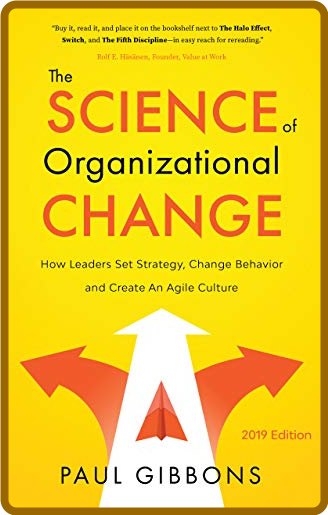
epub | 1.02 MB | English | Isbn: B07QL2M9GK | Author: Russ "The Agiliser" Lewis | Year: 2019
Description:
Leaders need guidance on leading change grounded in the latest science, not 20th-century myths. In this updated 2019 edition of The Science of Organizational Change, Paul takes us on a journey from change mythology, from New Age change ideas, from "reports in drawers", and from pop psychology up to the present.
In the first comprehensive treatment of behavioral science in business, you'll learn which cognitive biases caused the 2008 Financial Crisis, Enron, and the Deepwater Horizon. Later in the book, you'll discover how evidence-based management is helping leading businesses including Google.
There are new concepts such as change-agility that answer the question - "how can organizations be more responsive, so they are the disruptors, rather than the disruptees?" Turbulent environments demand constant change, but the mindset, skills, and behaviors taught to business leaders are unhelpful and sometimes flatly misleading.
In The Science of Organizational Change, Paul offers the first blueprint for change for that fully reflects the newest advances in mindfulness, behavioral economics, sociology, and complexity theory.
The Science of Organizational Change first identifies dozens of change management myths, bad models, and unhelpful metaphors, replacing some with twenty-first-century research. Gibbons links the origins of theories about change to the history of ideas and suggests that the human sciences will provide real breakthroughs in our understanding of people in the twenty-first century. For example, change fundamentally entails risk, yet little is written for business people about how breakthroughs in the psychology of risk can help change leaders. Change fundamentally involves changing people's minds, yet the most recent research shows that the provision of facts may strengthen resistance.
Starting with a rigorous and evidence-based understanding of what makes people in organizations tick, he presents a complete framework for organizing your company around successful change. With case studies from Google, IBM, Shell, British Airways, British Petroleum, HSBC, and Morgan Stanley, Gibbons goes deeper and broader than any previous discussion of the subject.
In this multi-disciplinary treatment of change leadership, you will learn:
How a deeper understanding of flaws in human decision-making can help you make far better choices when the stakes are largest.
How new advances in neuroscience have altered best practices in influencing colleagues, negotiating with partners, engaging followers' hearts, minds, and behaviors, and managing resistance.
How to bring greater meaning and mindfulness to your organization - and reap their benefits.
How new ideas from analytics, forecasting, and risk are humbling those who thought they knew the future - and how the human side of analytics and the psychology of risk are paradoxically more important in this technologically enabled world.
How to improve your boardroom, promoting more effective conversations about strategy, ethics, and decision-making.
What chaos and complexity theories mean in the context of your own business.
How to create resilient and agile business cultures, and anti-fragile, dynamic business structures.
To link science with your "on-the-ground" reality, Gibbons interviews top CEOs who are applying its principles. You'll find case studies from well-known companies like IBM and Shell; and deeply relevant quotations from history's greatest leaders and thinkers.Hailed as "the best book on change in 15 years" and a book that belongs alongside classics such as The Halo Effect, Switch, and the Fifth Discipline - The Science of Organizational Change is a must-read for senior executives and change experts alike.
Category:Business Decision-Making, Business Decision Making, Decision-Making & Problem Solving

